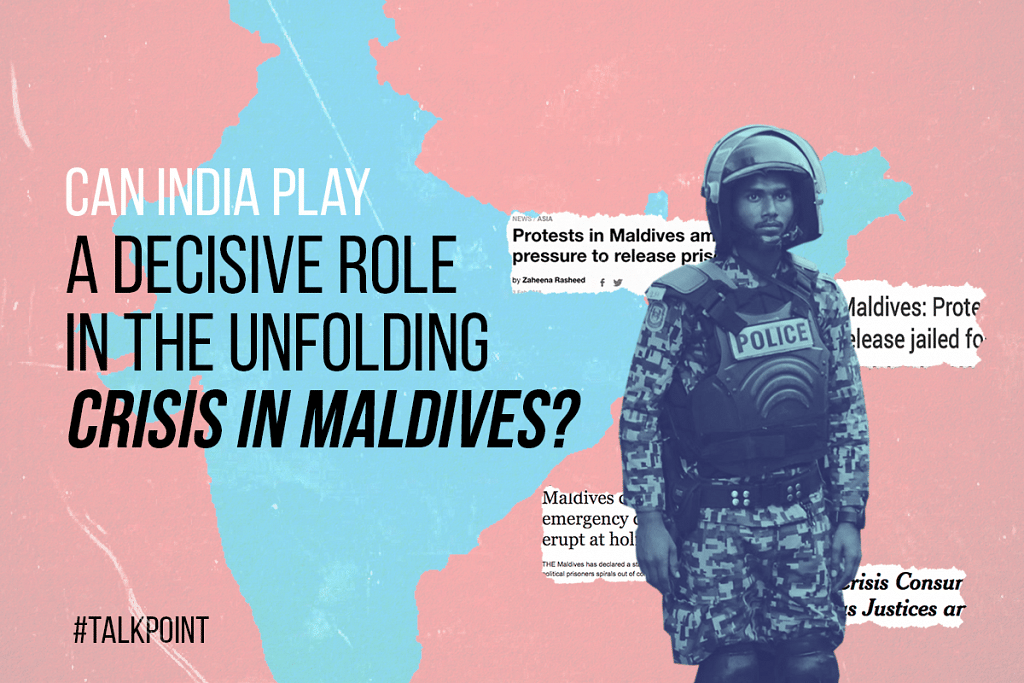A state of emergency has been declared in the Maldives, after the government arrested the leader of the opposition and two Supreme Court judges Monday. The court had ordered the release nine political prisoners, a move that the government of Abdulla Yameen declined. India has supported the opposition leaders.
ThePrint asks: Can India play a decisive role in the unfolding crisis in Maldives?
Involvement in the Maldives crisis will make India look like a regional bully
Former diplomat
India has overreacted to the events in Maldives, a tiny country with a population of just four lakh people. Sadly, we create an impression of India being a regional bully. The politics in Maldives has been on a roller coaster with shifting alliances and realignments. There was no conceivable reason to have taken a prescriptive approach in the given situation.
The restraint that characterised the Indian attitude in comparable situations in Bangladesh or Myanmar was commendable and paid dividends. The same discreet approach could have been adopted.
We are creating a misperception that we are seeking ‘regime change’ in Male. The United States or the United Kingdom may have their own axe to grind in a regime change in the Maldives and to transform those atolls into a second Diego Garcia in the Indian Ocean. But India should not identify with it.
The paranoia about Chinese influence is an alibi, because we are underestimating the tenacity of small countries to pursue independent policies in a multipolar setting. At any rate, this entire concept that the region is India’s ‘sphere of influence’ is archaic. Our bitter experience in Sri Lanka and Nepal should have taught us that small countries also treasure their sovereignty.
As for ‘Islamism’ in Maldives, the less said the better. Simply put, it is the prerogative of a Muslim country to anchor its cultural nationalism in Islam – just as we here in India keep rooting for ‘Hindu rashtra’. Who are we to draw the line for a Muslim country?
Maldives crisis is an opportunity for India to stake its claim to being a player once again
Editor of ‘Defence & Security Alert’ and a BJP MLA in Rajasthan
In terms of percentage of population, Maldives has the largest presence in the Islamic State (ISIS/Daesh). This chilling fact is enough to compel greater attention toward what is regarded as an idyllic holiday destination. Since the campaign against Daesh is a global responsibility, it behoves upon all countries to remain focussed on events within Maldives. And this is even more so when conditions have considerably worsened in the archipelago during the last few days.
For years, it was a case of an overbearing President storming the opposition. But now it is an even greater crisis with the Supreme Court intervening in a censorious manner against the President. This has got the President’s goat, and he remains defiant.
This breakdown is far more serious than was the case in 1988, when a combination of opponents and mercenaries compelled India to intervene. That intervention announced the arrival of India on the global stage. Thirty years later, there is another, greater, crisis. An increased Chinese presence, and the insidious nature of Daesh recruitment, makes the case even stronger.
This is an opportunity for India to stake its claim to being a player once again, especially since any global role is always dependent on a country’s performance in the neighbourhood first. It is imperative that India intervene, in a manner and point of its own choosing.
Maldives today is not what it was in 1988, and neither is India, nor the world. So, the nature of the intervention must also reflect the changes. The same formula is not always applicable, or desirable.
India has dropped the ball over Maldives in the past and the policy drift has to be reviewed objectively
Director, Society for Policy Studies
India should play ‘a role’ to stabilise the current turbulence in the Maldives, since the island nation is of strategic relevance to New Delhi in the long run.
A large cross-section of the local citizenry looks to India for providing support/help — as was the case in November 1988. At that time, a mercenary coup against the Maldives President was swiftly nipped in the bud by Rajiv Gandhi, and this was enabled largely due to the timely deployment of the Indian military.
My assessment is that the political will then exuded by the South Block was shaped by the confidence that credible military capacity could be brought to bear in a distant location in the Indian Ocean. Furthermore, there was no opposition of any kind to the Indian initiative and the local Maldivian leadership and the citizens welcomed the Indian intervention. The global community led by the US supported this Indian action.
What kind of role India ought to play in the current crisis leads to the question: does Delhi have the will, and if I may add, comprehensive ‘capacity’ to intervene effectively, equitably and in an affordable and sustainable manner against the backdrop of the evolving crisis?
Political will to get involved in the internal affairs of another state to support the liberal/democratic impulse can be complex, contradictory and costly. The Indian experience in Sri Lanka/IPKF is a case in point. My sense is that the Modi government has the will to involve itself, but the capacity contour is blurred.
India has dropped the ball over the Maldives in the past, and unless the past policy drift has been objectively reviewed — and lessons learnt — impulsive intervention could be imprudent.
